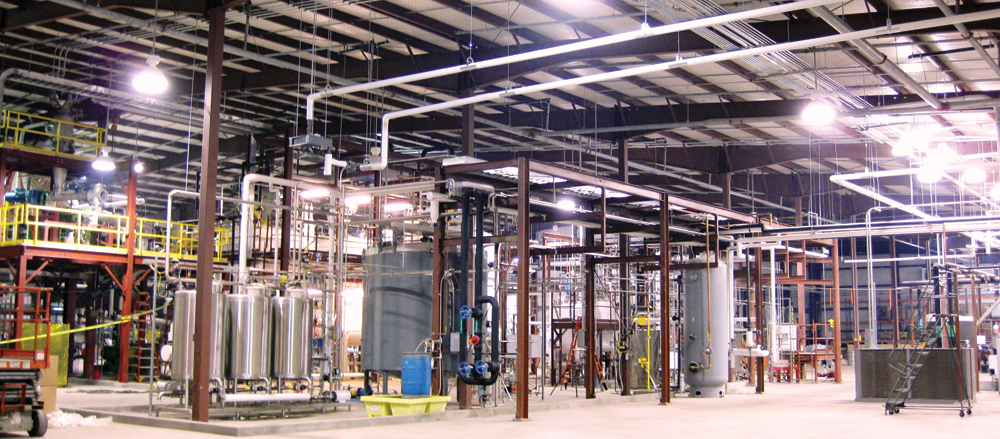Moving to the Big Time

PHOTO: MASCOMA CORP.
February 15, 2011
BY Kris Bevill
Valero Energy Corp., North America’s largest independent oil refiner and marketer and the third largest ethanol producer in the U.S., made steps recently to further diversify its transportation fuel portfolio. The company has signed a nonbinding letter of intent to invest up to $50 million of the equity required to finance Mascoma Corp.’s joint venture project to construct a 40 MMgy hardwood pulpwood-to-ethanol plant near Kinross in Michigan’s Upper Peninsula.
The $350 million Frontier Kinross LLC project will utilize consolidated bioprocessing technology developed by Mascoma at its Rome, N.Y. demonstration facility. The technology has been developed over the past five years and consists of a hydrolysis and fermentation process that utilizes genetically modified microorganisms to convert cellulosic fibers to sugar and produce alcohol in one step, without the addition of enzymes. Last September, the company purchased Canada’s SunOpta BioProcess Inc. in order to utilize its first-step pretreatment process for biomass, such as woody biomass.
“Valero’s proposed investment in our first commercial-scale production facility proves the economic practicality of Mascoma’s technology for the conversion of woody biomass into ethanol,” Mascoma CEO Bill Brady said following the investment announcement in January. “We are also thrilled to have Valero as a shareholder in Mascoma Corp. as there are many synergies even beyond the Kinross facility, where the technologies we have developed could be helpful to Valero’s business.”
Advertisement
Advertisement
In addition to equity, Mascoma’s agreement with Valero includes a coveted offtake agreement for fuel produced at the Kinross plant. Valero will also provide project development and construction oversight service for the project. A groundbreaking is planned for this spring. Production is expected to commence in 2013.
Valero media relations director Bill Day says Valero has been making selective investments in emerging technologies and biofuels projects for the past few years, beginning with its acquisition of corn ethanol plants and expanding to include ventures in algae-to-biofuels, renewable diesel from animal fats and cellulosic ethanol. “We’re interested in knowing what the next renewable energy technology is going to be,” he says. “So we’re making investments in various companies that are working on those, and cellulosic ethanol is one of the most promising.”
Valero’s investment in Mascoma is dependent upon the approval of both companies’ boards of directors and the validation of Mascoma’s technology. Day says there are “several steps” that Frontier must accomplish before the nonbinding letter becomes a solid commitment, but that is to be expected at a first-of-its-kind facility. Mascoma declined to provide further explanation of the agreement due to confidentiality restrictions.
Advertisement
Advertisement
The Frontier project has already received a fair amount of criticism, most notably from environmental activists concerned with the use of woody biomass as a feedstock. Mascoma’s partner in the project is forestry company J.M. Longyear LLC, which plans to provide feedstock that is “selectively harvested, naturally regenerated, and is an underutilized, abundant resource in the area surrounding the Kinross biorefinery,” according to Mascoma. The Michigan chapter of the Sierra Club filed a suit against the state’s department of natural resources in December over the department’s approval of an air permit for the facility. The group dropped its lawsuit shortly after filing, but continues to claim the facility is a poor use of Michigan resources and state funding. The project has received $23.5 million in funding from the Michigan Economic Development Corp. and is awaiting U.S. DOE approval for a $200 million loan guarantee.
Day says Valero is always concerned about the environmental impacts of its projects. “But we wouldn’t be moving forward with this project if we were not comfortable with the technology,” he says. Steve Hicks, CEO of Frontier and J.M. Longyear says an extensive 14-month review, which included a public comment period, was conducted by the department of natural resources before it approved the facility’s air permit application.
With Valero’s offtake agreement, Mascoma says it now has the entire process of commercializing cellulosic ethanol covered, from raw materials supply, to preprocessing, through production and distribution. It plans to become a top provider of process technology in the industry. Valero’s future will likely include more investments like the Mascoma agreement, with Valero providing the funding to commercialize previously developed technology. “We don’t have the research and development arms that a lot of the bigger oil majors have,” Day says. “So we choose to invest in companies that are doing that, or in some cases we just buy the whole company.”
—Kris Bevill
Upcoming Events





